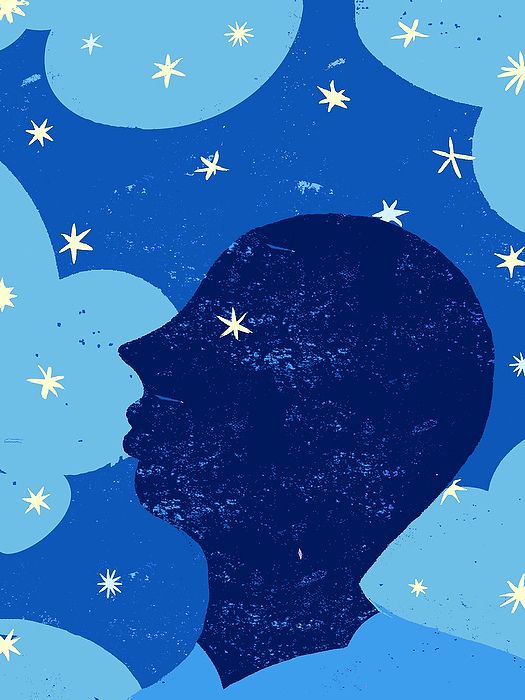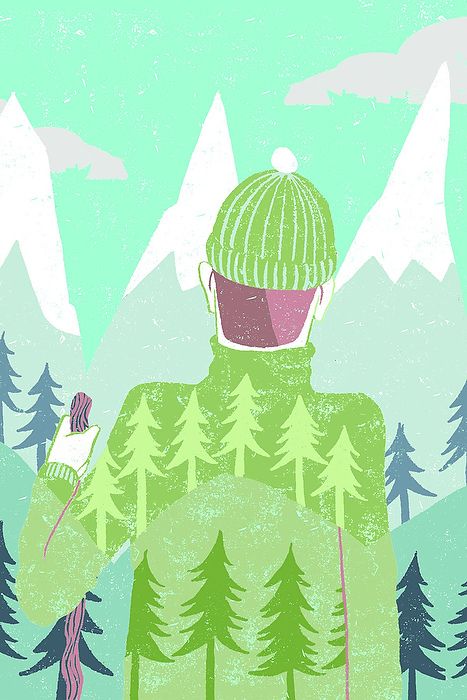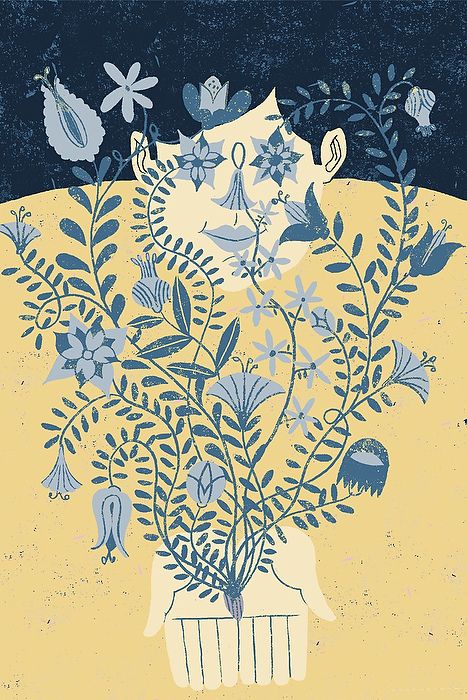Well*be*ing
Noun: the state of being happy, healthy, or successful.
Seven professors share what wellbeing means to them.

Associate Professor of Classical Languages Jim Powell once noted that our motto, Pro Humanitate, means “for human flourishing.” Like those big, extravagantly beautiful weeping cherry trees that bloom each spring on Davis Field, I think we all want to bloom, flourish, thrive.
As a theatre artist I work with the whole, interconnected person, and it seems obvious that we humans don’t work very well when our bodies aren’t taken care of. We need good food and exercise — or, as I prefer, “play.” These should be pleasurable: our bodies improve with challenge but are not machines to simply deny and punish. Resilience, flexibility, expressiveness and openness to new tastes and experiences are what I’m after. Our emotional and intellectual selves are inextricable from this physical experience, and they also work optimally when challenged and nourished. The trick, I think, is to think of these as “play,” too, remembering to enjoy the growth and not treat it as drudgery.
(Composer) John Cage once said, “Take pleasure where you can find it. It’s all lighter than you think.” We need pleasure, and we need to look for pleasure in what nourishes us. Art can give us both. Great plays, music, dance, film, visual art and literature are the result of deep exploration of our humanity, moving us emotionally, making us laugh, helping us see, hear, feel and think about the world more consciously. Art wakes us up to ourselves and to the world around us, stimulating us to live each moment, mind, body and heart. Only then can we genuinely thrive.
As a psychologist, you’d expect me to say that wellbeing is all about being happy, and to some extent you’d be right! We value being happy, and life is much easier to bear when one is in a good mood. That said, I think wellbeing means something more than just being happy all the time.
For me, wellbeing is also the satisfaction you get from accomplishing life goals that are meaningful to you — raising a family, completing an important work project or setting a personal record at a sports event. But wellbeing is also about doing well across your whole life, and I think cultivating certain types of attitudes and having life experiences that challenge us can contribute to lasting wellbeing.
My colleague Laura Blackie and I believe that such attitudes and experiences develop the capacity to make good judgments about what matters in life and to act on these judgments within the boundaries of what is under one’s control — what we call wisdom.
One implication of this lifespan approach to wellbeing is that some experiences that are challenging in the moment may, in fact, benefit us in the long run. Of course, many experiences can harm us (we have to remember that we are both capable and vulnerable beings), but striving to grow from our life experiences represents one pathway to lifelong wellbeing.

"One implication of this lifespan approach to wellbeing is that some experiences that are challenging in the moment may in fact benefit us in the long run."
I find wellbeing to be intimately wrapped up with the meaning of one’s projects and the meaning of one’s projects to depend essentially on the existence and flourishing of others.
In a New York Times essay (“The Importance of the Afterlife. Seriously.”), philosopher Samuel Scheffler asks how we would feel if we knew beyond any doubt that a giant asteroid would eliminate all life on this planet shortly after our death, or, alternatively, that no new children would be born after the next generation, and thus that the human race would certainly disappear in the relatively near future.
What meaning or fulfillment would we find in any of our present activities under that scenario? Knowing that the end of humanity is imminent, what would motivate even the most self-regarding of us to work, to create, to make plans? Scheffler argues — and I agree — that our wellbeing is heavily dependent on the continued collective existence of humanity after our death. And no doubt the accelerating pollution, climate change, species extinction, overpopulation and resource depletion of the Anthropocene are the greatest threats to the wellbeing of future generations.
I therefore find the greatest fulfillment in activities that I hope will promote ongoing collective wellbeing in this respect. Conceptions of wellbeing that focus on individual goals put the cart before the horse by ignoring collective wellbeing as the very condition of individual wellbeing.
"Knowing that the end of humanity is imminent, what would motivate even the most self-regarding of us to work, to create, to make plans?"
Sociologists’ commitment to understanding and reducing social inequality often leads us to focus on negative outcomes like health disparities. In the process of understanding bad health we sometimes gain insights into wellbeing. Sociologists of religion have repeatedly found positive effects of religious involvement on many health outcomes, especially for disadvantaged social groups.
Here are five ways religion can promote wellbeing: It promotes more healthy lifestyles, in terms of abstinence from or at least moderation in things like alcohol, drugs and other risky behaviors; it connects people in a deep and meaningful way, facilitating friendships and other networks of social support, both material and emotional; it provides mechanisms (both beliefs and practices) for coping with the stressors that reduce physical and mental wellbeing; it enhances feelings of self-esteem and efficacy; and it encourages healthy emotions like forgiveness and hope.
Many caveats apply. There are certainly toxic forms of faith. People who are not religious can live wonderfully healthy lives (look at Norway). And there are other secular mechanisms for achieving some of these same outcomes, like joining a tennis league. But religion brings these mechanisms together in a coherent and compelling manner for many people. So, if you are not already religiously involved, you might consider taking up Pascal’s Wager, for your own wellbeing.

ASSOCIATE PROFESSOR OF COUNSELING AND ASSOCIATE DEAN FOR FACULTY RECRUITMENT, DIVERSITY AND INCLUSION
As a former counselor I’ve spent a fair amount of time helping others work on issues of holistic wellness. As a researcher in cultural competence and health disparities I’ve spent a fair amount of time researching various aspects of holistic wellness. And as a husband and father I’ve spent a fair amount of time trying to be intentional about my pursuit of holistic wellness.
So what have I learned about wellness? It’s easier to talk about it than it is to practice it. It’s just so much easier to forget healthy ways of self-care or caring for others; so much easier to get too wrapped up in daily life and responsibilities. And yet, in spite of my own shortcomings as a counselor, scholar, and spouse and dad, I’ve learned that “achieving wellness” is really about not giving up on striving for a more balanced and positive outlook on life. It also helps to surround yourself with loved ones that have your wellness in mind, find a hobby or two to keep you occupied and to not be too hard on yourself.
Better yet, my late friend and colleague, Dr. Jane Myers, pretty much “wrote the book” on holistic wellness in the counseling field. She summed up wellness like this: “Wellness is a way of life oriented toward optimal health and wellbeing in which body, mind and spirit are integrated in a purposeful manner with a goal of living life more fully.” Couldn’t have said it better myself.
"So what have I learned about wellness? It's easier to talk about it than it is to practice it."
True wellness to me is about settling into balance and community in a human world driven by increasing communication complexity and the unpredictable flow of global economic interests. The Hopi have a word for such states of imbalance, Koyaanisqatsi. In the Choctaw language, it is called Haksuba.
Balance and community are our birthright and our deepest wellspring of being; they are patterned in the bodily rhythms of inbreath and outbreath, the symmetry of our body’s shape, and are prefigured in our need to touch and be touched, to speak and to be heard, and to feel and be felt deeply. Moving into balance and community through an exploration of ancient traditions of contemplation to create mindful silence, stillness and spaciousness in a spirit of compassion is one powerful way in which our University can embrace wellness in this time of imbalance. And as Gautama Buddha is said to have taught, it is our mind, individually and collectively, that creates our world.

"It is flourishing: using your unique talents and abilities to their fullest in the service of goals that are important."
Aristotle said that the highest human good, the thing for the sake of which we do everything else, is eudaimonia. That word is hard to translate. It’s often rendered as “happiness,” but it’s deeper than what “happiness” usually means. It doesn’t mean mere contentment, for example, or mere pleasure. Eudaimonia is a state of knowing that you’re living your life well and fully. It is flourishing: using your unique talents and abilities to their fullest in the service of goals that are important. It is striving to make not only your own life better, but also to improve the lives of those you interact with as well; it is knowing that you are providing productive value to the world.
One of the things I study is the social institutions — political, economic and cultural — that enable people to lead eudaimonic lives. We have a wealth of empirical data about how different kinds of institutions affect people’s lives, and my discipline of political economy seeks not only to understand human social institutions, but also to encourage the right kinds of institutions. In this way, understanding what eudaimonia is and how it can be achieved is not merely an academic investigation — it is a moral one.
There are indefinitely many different kinds of eudaimonic life, indefinitely many paths people can take to achieve their highest good. Examining social institutions in terms of their ability to let people lead, as President Hatch says, “lives that matter,” is at the core of political economy just as it is at the core of our mission at Wake Forest University.








